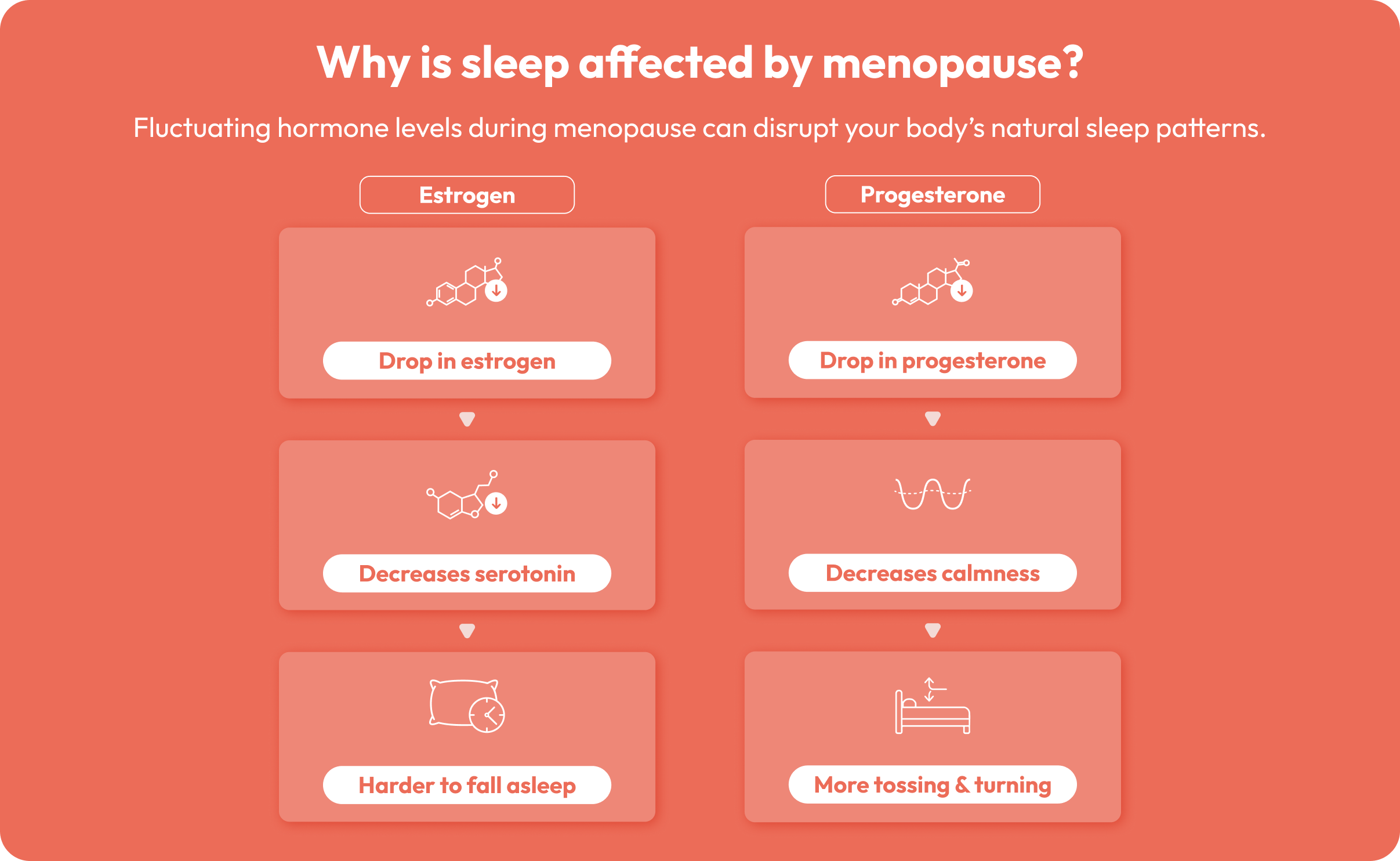Sleep disruptions: Causes, symptoms, & treatments
You might not think of your hormones when you’re lying awake at 2 a.m., staring at the ceiling and wondering why you can’t fall asleep. Many women blame stress, aging, too many thoughts before bed, or restlessness, but sleep disruptions are often one of the earliest signs of perimenopause or menopause, even before periods become irregular.
As estrogen and progesterone begin to fluctuate, the systems in your brain and body that regulate sleep become more sensitive. This can make you feel more alert at night, more prone to early-morning awakenings, or simply off in your usual sleep patterns.
And because these shifts happen gradually, many women don’t realize their sleep issues may be hormonal, not just situational. On top of that, midlife is also a time when conditions like sleep apnea or restless legs syndrome can surface, which can make it confusing when you’re trying to grasp what’s going on with your body.
Dr. Sherry explains, “It’s common for women to experience sleep disturbances as a result of the typical symptoms of perimenopause and menopause, including hot flashes, night sweats, depression, anxiety, and other mood disorders.”
If sleep has become more challenging lately, you’re not alone. Hormonal changes can have a real impact on how well you rest. Let’s take a closer look at why sleep shifts during menopause and perimenopause, and what you can do to get your rest back.
What disturbs sleep during menopause and perimenopause?
Falling estrogen levels affect sleep both directly and indirectly. According to more recent studies, declining estrogen and progesterone impact systems throughout the body that regulate temperature, mood, breathing, and circadian rhythms. These include:
Thermoregulation
When estrogen drops, the brain becomes far more reactive to small changes in body temperature. This heightened sensitivity causes cooling responses, like the warm flushing feeling, sweating, or that sudden wave of heat to activate at much lower core temperatures than before. These hot flashes and night sweats can pull you out of deeper sleep or wake you entirely. In fact, research shows that many women wake up seconds before the hot flash is felt, meaning the brain’s temperature centers are triggering the sleep disruption first.
Mood changes
As hormone levels fall, mood swings, anxiety, and irritability can increase, making it harder to fall asleep or fall back asleep after waking. Even women without a history of mood swings may notice new emotional sensitivity during this transition, which naturally affects sleep quality.
Metabolism and weight changes
Drops in estrogen shift how the body processes and stores energy, which can lead to gradual weight gain. Increased weight around the neck and upper body can make snoring or sleep apnea more likely. Because sleep apnea in women often looks like insomnia or light, restless sleep rather than loud snoring, it frequently goes undiagnosed and continues to disrupt restorative sleep.
Circadian rhythm shifts
Your circadian rhythm is your internal clock that tells your body when to feel awake and when to sleep. With menopause, this rhythm naturally weakens. You might find yourself getting tired earlier in the evening, waking up earlier in the morning, or waking multiple times throughout the night. Even if you’re not experiencing hot flashes or night sweats, this internal shift alone can make sleep feel less stable.
Underlying sleep disorders
Some sleep disorders become more common with age and can be amplified by hormonal changes. Restless legs syndrome may cause uncomfortable sensations that make it harder to relax at night, while sleep apnea can lead to pauses in breathing that repeatedly interrupt sleep cycles. Because the symptoms in midlife women can be subtle, like daytime fatigue, restless sleep, and frequent awakenings, these conditions often blend into what women assume is “just menopause,” delaying diagnosis and treatment.


Types of sleep disturbances
Sleep problems affect many women during the menopausal transition. A SWAN study reveals that sleep disturbances are prevalent throughout the stages of menopause. These may include:
- Difficulty falling asleep
- Waking up frequently during the night
- Waking too early
- Restless or unrefreshing sleep
- Restless legs or nighttime movement
- Snoring or sleep apnea
Dr. Sherry shares, “The majority of perimenopausal and menopausal women experience insomnia, snoring, and bouts of sleep apnea.” When sleep and movement support each other, it creates a rhythm that helps stabilize mood, improve energy, and make menopausal symptoms feel more manageable overall.
How to improve your quality of sleep during menopause and perimenopause
Menopause hormone therapy (MHT)
MHT can help by stabilizing hormone levels and reducing hot flashes and night sweats, which are two of the biggest contributors to sleep loss. In fact, studies show that women using low-dose hormone therapy reported significantly better sleep quality compared with those on placebo.
Many women experience fewer nighttime awakenings and improved overall sleep quality as their symptoms become more manageable with hormonal treatment.
Establishing a regular sleep schedule
Going to bed and waking up at the same time every day helps regulate your internal clock or your circadian rhythm, even if you’re not sleeping well. By creating a sleep schedule, you can help your body attune to a routine that can improve your quality of sleep so that you’re more rested.
Over time, a stable sleep schedule signals to your brain when it’s time to wind down and when it’s time to be alert, which is especially important when fluctuating hormones are throwing those signals off.
Dr. Sherry shares, “Sleep is necessary for everyone. In a perfect world, getting at least seven hours a night is ideal. Getting adequate amounts of sleep restores the body and improves energy levels.”
Creating a relaxing bedtime routine
Winding down before bed is extremely beneficial and helpful in preparing for sleep. If you struggle with falling asleep, a relaxing bedtime routine can help you let the stresses of the day go, so you can truly relax.
Try incorporating calming habits like warm baths, herbal tea, stretching, meditation, calming music, or reading. Make your sleep environment supportive by making it work for you. A dark, quiet, cool, and calming room can make all the difference. If you enjoy essential oils, lavender can help create a more calming atmosphere in your room, and sleepy time tea can help you feel more relaxed and, of course, sleepy.
Avoiding caffeine and alcohol before bed
Caffeine and alcohol can interfere with falling asleep, staying asleep, and reaching the deeper stages of rest that restore your body and mind. Caffeine is a stimulant that lingers in your system for hours and can keep your brain more alert at night.
Alcohol may make you feel drowsy at first, but it disrupts the deeper, more restorative stages of sleep and causes more awakenings later. Both can leave you feeling less rested and more fatigued the next day.
Moving your body
Exercise supports sleep by reducing stress and improving circulation. Even light stretching can help you wind down so that when you engage in your sleep routine, you’ll begin to feel more relaxed.
Dr. Sherry shares. “Quality sleep helps maintain a healthy weight and makes exercising much easier.”
The positive effects of both sleep and exercise build on each other over time. Better sleep often leads to more energy for exercise, and more movement during the day supports deeper, more restorative sleep at night.
Talking to your doctor if you have chronic sleep problems
If you’ve tried adjusting your routine and symptoms are still getting in the way of rest, it’s worth talking with your doctor. Conditions like sleep apnea, restless legs syndrome, thyroid disorders, anxiety, and depression often become more noticeable during menopause and can significantly disrupt sleep if left untreated.
A medical evaluation can help uncover whether an underlying issue is contributing to your sleep problems, and getting the right treatment can dramatically improve your nights (and your days).
Feeling more anxious than usual? See how hormone therapy can help you find your balance again.
Hormonal changes during menopause can heighten anxiety, worry, or restlessness, even if you’ve never struggled with it before. You don’t have to push through it alone. QuickMD doctors can help restore hormonal balance to support a calmer mind, steadier mood, and sense of control.
We just launched our Menopause Hormone Therapy Membership in select states, and your first month’s on us. You’ll get to meet with a doctor, ask all your questions, and see if treatment might help.
If you love it and want to keep going, it’s $ 79/month after that, with special member pricing on medication and regular access to your doctor. And if you decide it’s not for you – that’s totally fine too. Get started by booking your free visit now.

